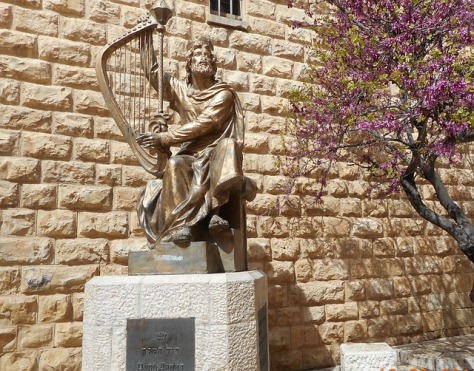
Violence and Strife in possession of it, spies prowling about the walls day and night, Evil and Trouble in its midst, and Destruction, Oppression, and Deceit—a goodly company—flaunting in its open spaces. And the spirit, the brain of the whole, is the trusted friend whom he had made his own equal, who had shared his secretest thoughts in private, who had walked next him in solemn processions to the temple. Seeing all this, what does the king do, who was once so fertile in resource, so decisive in counsel, so prompt in action? Nothing. His only weapon is prayer. "As for me, I will call upon God; and the Lord will save me. Evening, and morning, and at noon, will I pray, and cry aloud: and He shall hear my voice." He lets it all grow as it list, and only longs to be out of all the weary coil of troubles. "Oh that I had wings like a dove, then would I fly away and be at rest. Lo, I would flee far off, I would lodge in the wilderness. I would swiftly fly to my refuge from the raging wind, from the tempest." The langour of his disease, love for his worthless son, consciousness of sin, and submission to the chastisement through "one of his own house," which Nathan had foretold, kept him quiet, though he saw the plot winding its meshes round him. And in this submission patient confidence is not wanting, though subdued and saddened, which finds expression in the last words of this psalm of the heavy laden, "Cast thy burden upon Jehovah. He, He will sustain thee.... I will trust in Thee."
When the blow at last fell, the same passive acquiescence in what he felt to be God's chastisement is very noticeable. Absalom escapes to Hebron, and sets up the standard of revolt. When the news comes to Jerusalem the king's only thought is immediate flight. He is almost cowardly in his eagerness to escape, and is prepared to give up everything without a blow. It seems as if only a touch was needed to overthrow his throne. He hurries on the preparations for flight with nervous haste. He forms no plans beyond those of his earlier wish to fly away and be at rest. He tries to denude himself of followers. When the six hundred men of Gath—who had been with him ever since his early days in Philistia, and had grown grey in his service—make themselves the van of his little army, he urges the heroic Ittai, their leader, to leave him a fugitive, and to worship the rising sun, "Return to thy place, and abide with the king"—so thoroughly does he regard the crown as passed already from his brows. The priests with the ark are sent back; he is not worthy to have the symbol of the Divine presence identified with his doubtful cause, and is prepared to submit without a murmur if God "thus say, I have no delight in thee."
With covered head and naked feet he goes up the slope of Olivet, and turning perhaps at that same bend in the rocky mountain path where the true King, coming to the city, wept as he saw its shining walls and soaring pinnacles across the narrow valley, the discrowned king and all his followers broke into passionate weeping as they gazed their last on the lost capital, and then with choking sobs rounded the shoulder of the hill and set their faces to their forlorn flight. Passing through the territory of Saul's tribe—dangerous ground for him to tread—the rank hatred of Shimei's heart blossoms into speech. With Eastern vehemence, he curses and flings stones and dust in the transports of his fury, stumbling along among the rocks high up on the side of the glen, as he keeps abreast of the little band below. Did David remember how the husband from whom he had torn Michal had followed her to this very place, and there had turned back weeping to his lonely home? The remembrance, at any rate, of later and more evil deeds prompted his meek answer, "Let him curse, for the Lord hath bidden him." The first force of the disaster spent itself, and by the time he was safe across Jordan, on the free uplands of Bashan, his spirit rises. He makes a stand at Mahanaim, the place where his great ancestor, in circumstances somewhat analogous to his own, had seen the vision of "bright-harnessed angels" ranked in battle array for the defence of himself and his own little band, and called the name of the place the "two camps." Perhaps that old story helped to hearten him, as the defection of Ahithophel from the conspiracy certainly would do. As the time went on, too, it became increasingly obvious that the leaders of the rebellion were "infirm of purpose," and that every day of respite from actual fighting diminished their chances of success, as that politic adviser saw so plainly. Whatever may have been the reason, it is clear that by the time David had reached Mahanaim he had resolved not to yield without a struggle. He girds on his sword once more with some of the animation of early days, and the light of trustful valour blazes again in his old eyes.
No comments:
Post a Comment